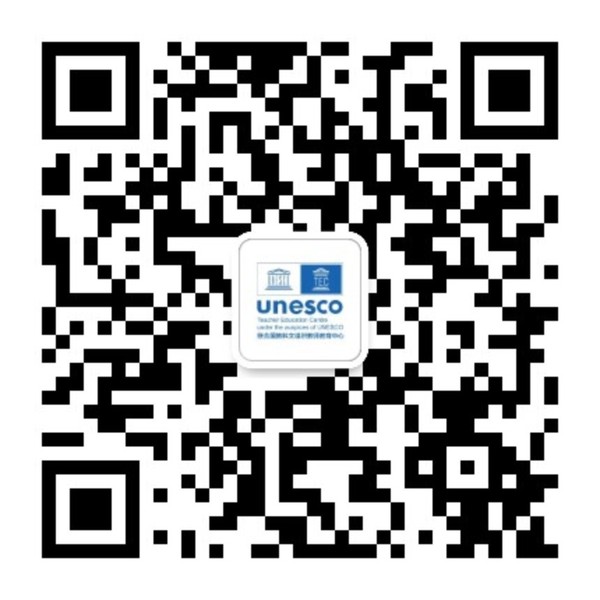On the morning of February 28, 2025, the closing ceremony of the Hong Kong STEAM Education Leaders Exchange and Training Program was successfully held at the UNESCO Teacher Education Centre (TEC). Attendees included Ms. Hung Lai-ting, Chief Curriculum Development Officer (Primary School-based Curriculum Development) of the Education Bureau of the Government of the Hong Kong Special Administrative Region of the People's Republic of China; Mr. Tse Pan-lun, Senior Curriculum Development Officer (Science); Mr. Tong Wai-ming, Curriculum Development Officer (Science); Professor Zhang Minxuan, Director of TEC; and 32 primary and secondary school principals and teachers from Hong Kong. The ceremony was chaired by Professor Hu Guoyong.
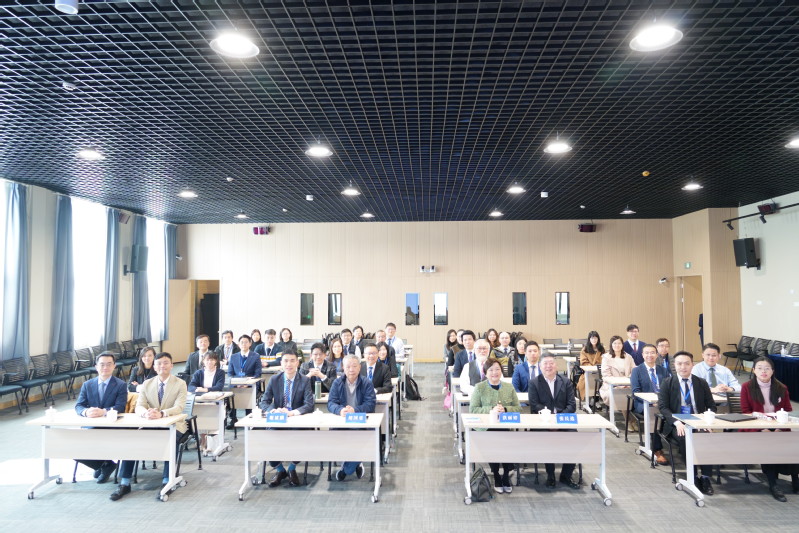
At the closing ceremony, participants first watched a project summary video together. Then, Ms. Hung Lai-ting, Chief Curriculum Development Officer (Primary School-based Curriculum Development) of the Hong Kong Education Bureau, delivered a speech. She reviewed the shared learning journey over the past few days and expressed sincere gratitude to the participating principals and teachers. Ms. Hung emphasized that the knowledge and experience gained were invaluable, as they would not only facilitate personal growth but also inspire big-picture thinking. She particularly thanked TEC for the meticulous organization of the program and paid tribute to all staff for their hard work. Finally, Ms. Hung expressed her hope that the knowledge and experience acquired by the participants would become an inexhaustible driving force for educational innovation, and looked forward to more exchange opportunities in the future to work hand in hand and contribute to the development of education.
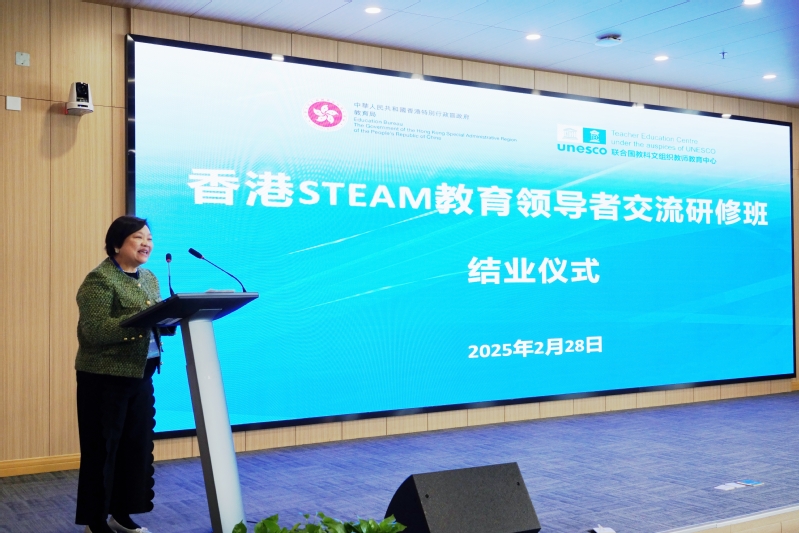
Professor Zhang Minxuan, Director of TEC, addressed the closing ceremony. He first extended warm congratulations on the successful conclusion of the program and sincerely hoped that the Hong Kong principals and teachers present would gather again in the future to participate in grand events of educational exchanges. Professor Zhang emphasized that education is a field that greatly requires interaction and inspiration; through exchanges, we can learn from each other and jointly promote the continuous progress and development of education. He expressed his expectation that Shanghai and Hong Kong, two shining pearls in education, would move forward hand in hand to create brilliance, and that both regions would take the lead in setting an example for the national education sector, jointly driving the vigorous development of education.
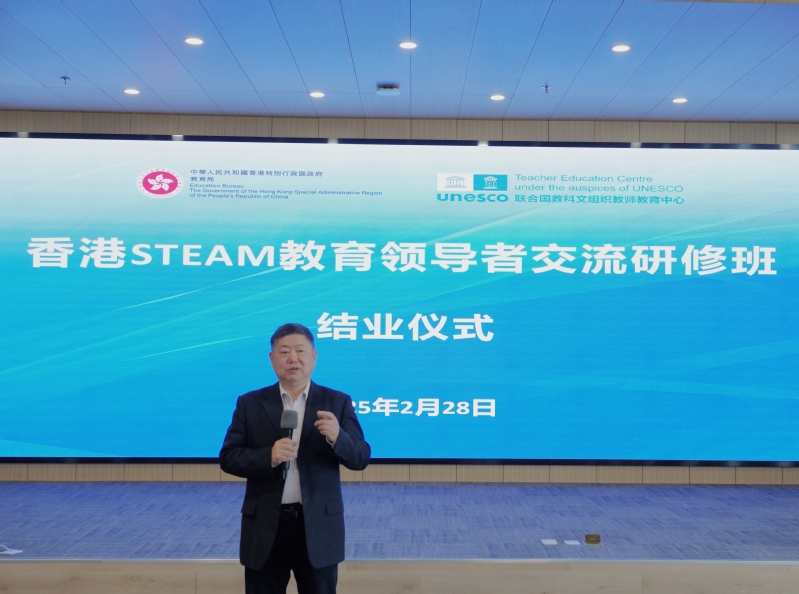
Finally, participants witnessed the certificate presentation ceremony together, bringing the program to a successful conclusion.
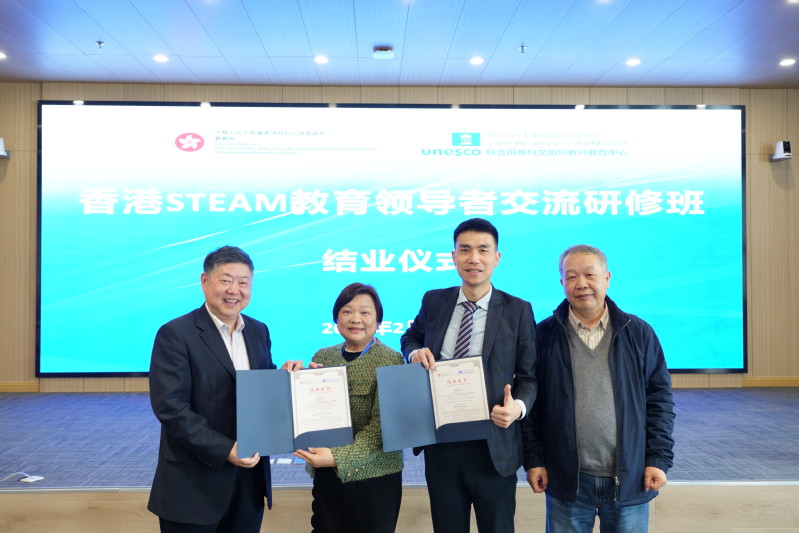
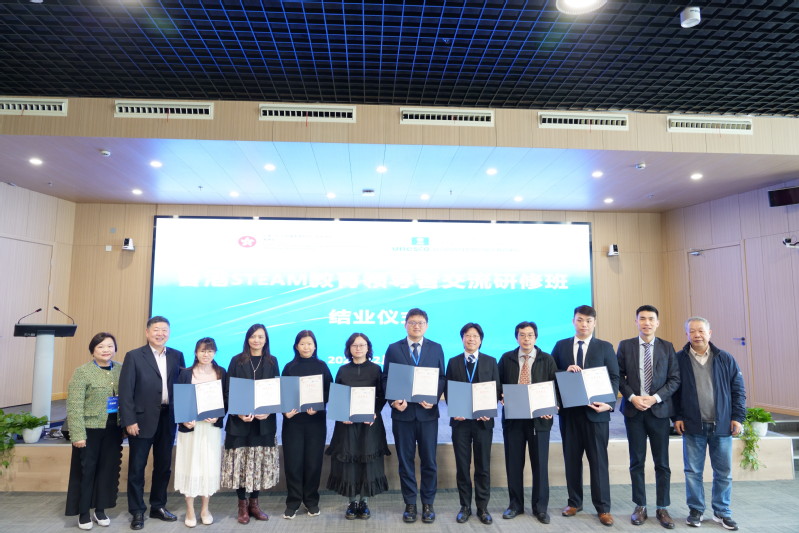
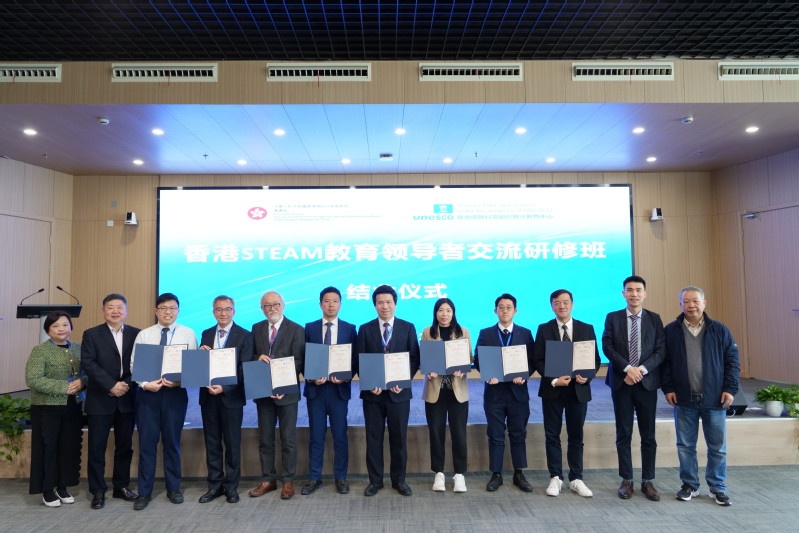
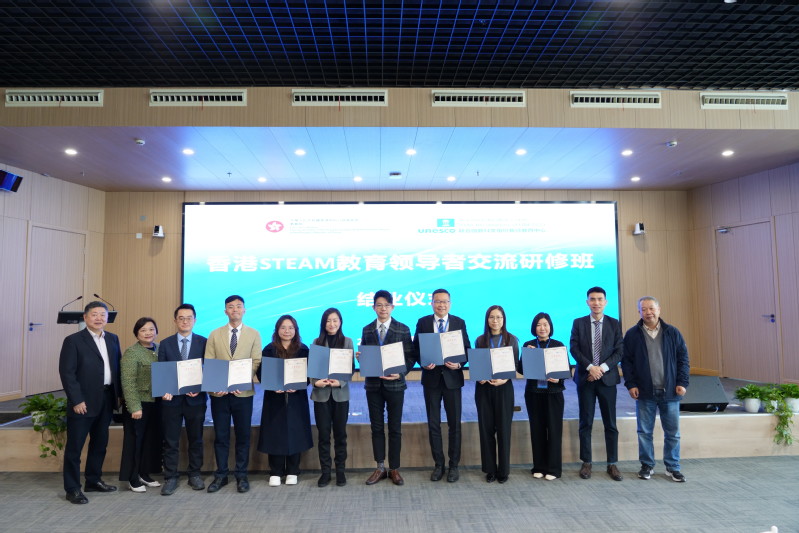
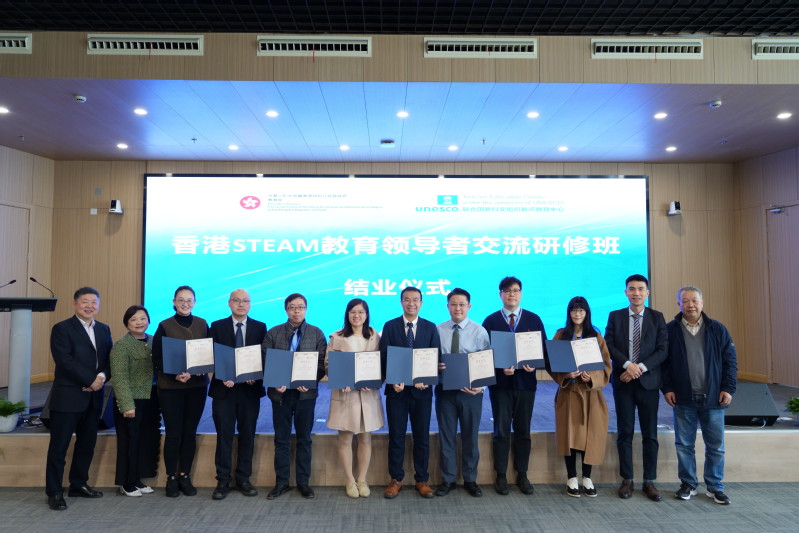
Looking back at the rich content of the program, thematic lectures, Shanghai-Hong Kong exchanges, and on-site visits stood out as the three highlights. In the thematic lecture session, Zhou Zhihua, founder of OUR SCHOOL Digital Campus; Ni Minjing, Director of Shanghai Science and Technology Museum; Xu Dianfang, former Director of the Shanghai Municipal Education Commission Teaching Research Office; Gao Yan, Deputy Director of the Shanghai Post-Teahouse-style Teaching Research Institute (a senior teacher); and Professor Zhang Minxuan, Director of TEC, delivered insightful lectures. They explored the connotation, development trends, and challenges of STEAM education from different perspectives, providing valuable educational concepts and practical experiences for the participants.
On February 24, Mr. Zhou Zhihua, founder of OUR SCHOOL Digital Campus, delivered an engaging lecture titled AI and STEAM Education. Mr. Zhou expressed his hope that AI education could bring positive changes to schools, students, and teachers. In the lecture, he demonstrated the our teacher AI platform and delved into how to build ideal scenarios with AI to smoothly integrate AI science into schools and classrooms, thereby stimulating students' strong interest in science education and improving teachers' teaching and office efficiency. On February 25, Mr. Ni Minjing, Director of Shanghai Science and Technology Museum, explored the connotation and practice of STEAM education from the perspective of museums. He pointed out that STEAM education is not simply a pile-up of high-tech education, but emphasizes practice on the basis of mastering more knowledge. The essence of science education is not merely to pursue practicality, but embodies the profound meaning of science is 'useless utility', aiming to cultivate students' comprehensive literacy and innovative ability rather than just instilling knowledge through experiments. Director Ni further emphasized that STEAM education is a continuous process that encourages children to discover and solve problems in practice, thereby fostering their autonomous learning ability and perseverance. When talking about how to carry out STEAM education, he advocated providing diverse practical opportunities for all children, allowing them to explore, discover, and innovate in practice. Meanwhile, Director Ni specifically mentioned that STEAM education should focus on cultivating children's autonomy, concentration, and tenacity, which are crucial for their future growth.
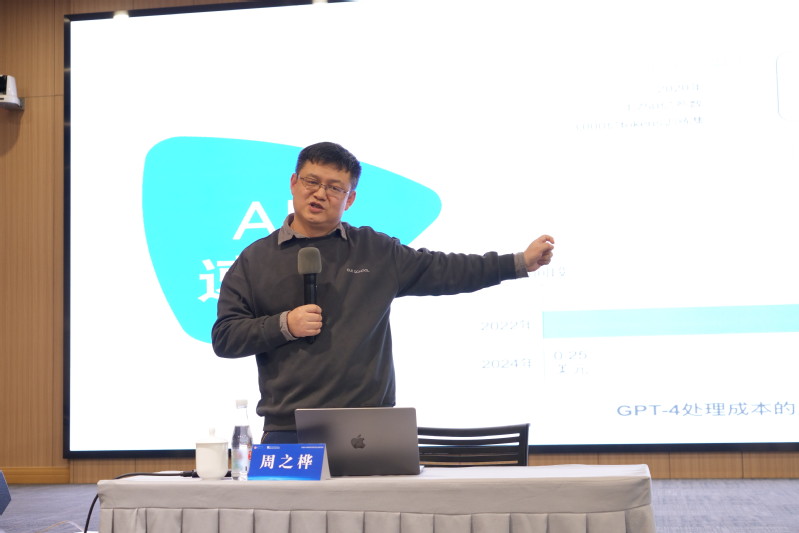
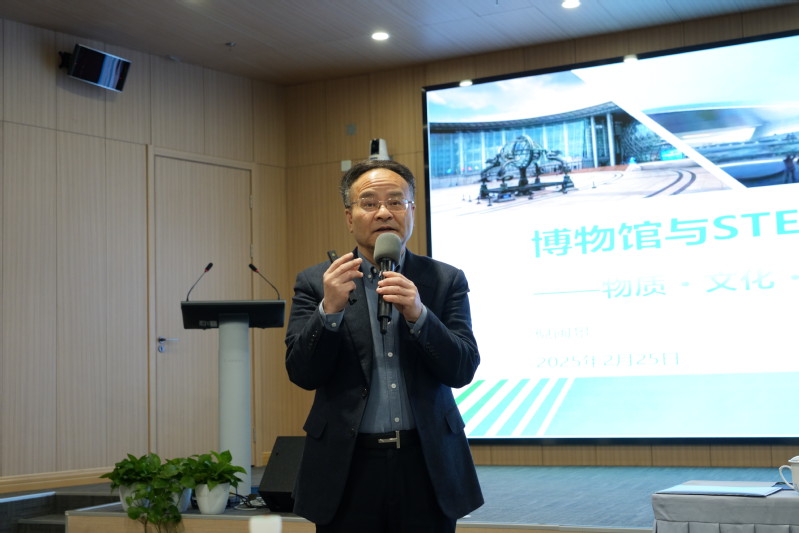
On February 26, Mr. Xu Dianfang, former Director of the Shanghai Municipal Education Commission Teaching Research Office, delivered a lecture themed Exploring STEM from the Perspective of National Curriculum Reform. Against the backdrop of national curriculum reform, the lecture systematically elaborated on the core direction and practical paths of current educational transformation. Mr. Xu pointed out that at the national curriculum plan level, China is striving to build an all-round reform framework oriented by core literacy, covering key areas such as teaching, evaluation, enrollment examinations, and school management, with an emphasis on organic integration of disciplines and cultivation of comprehensive practical abilities. On February 27, Ms. Gao Yan, Deputy Director of the Shanghai Post-Teahouse-style Teaching Research Institute, shared her insights on classroom teaching research, introduced the reform of Jing'an District Education College Affiliated School based on the concept of a big curriculum, and focused on explaining the characteristics and implementation of post-teahouse-style teaching and deeply integrated teaching. She emphasized that teachers should possess interdisciplinary literacy and actively innovate teaching methods to adapt to the requirements of educational reform and cultivate students' comprehensive abilities.
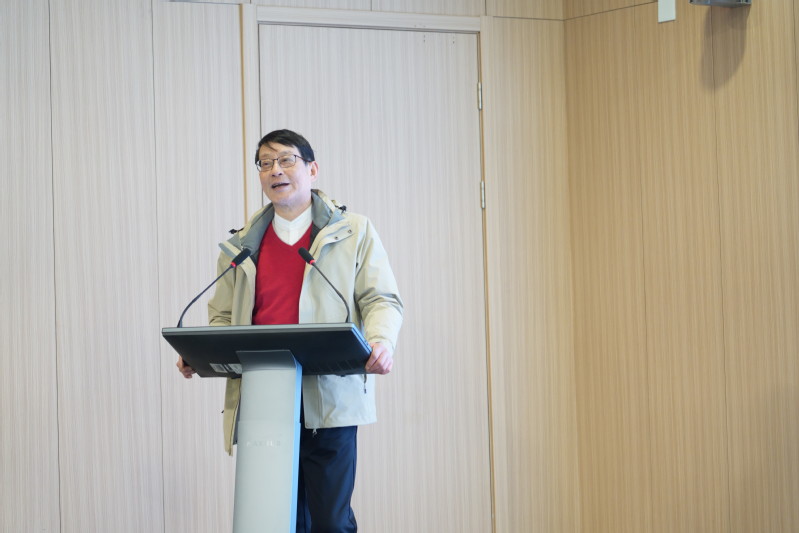
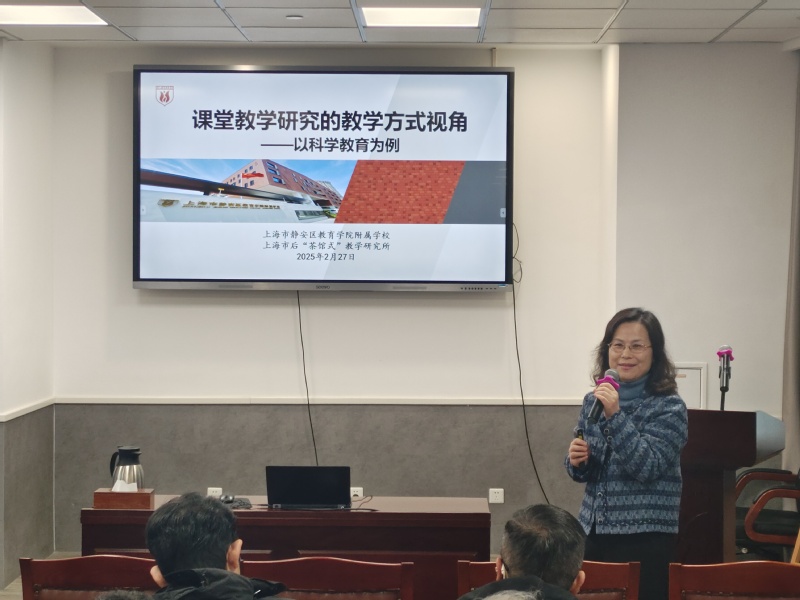
On February 28, Professor Zhang Minxuan, Director of TEC, delivered a lecture themed Shanghai's STEM Education from the Perspective of PISA. He discussed Shanghai's performance in mathematics and science in PISA tests and shared his thoughts on why STEM education should be carried out and how to implement it in the AI era. Professor Zhang believed that developing STEM education should be oriented to all to achieve fair and high-quality education, improve educational conditions, and teach students in accordance with their aptitude. It is necessary to actively add interdisciplinary courses, integrate new technologies, promote laboratory upgrading, and facilitate teacher professional development, so that cities and various institutions can support STEM education.
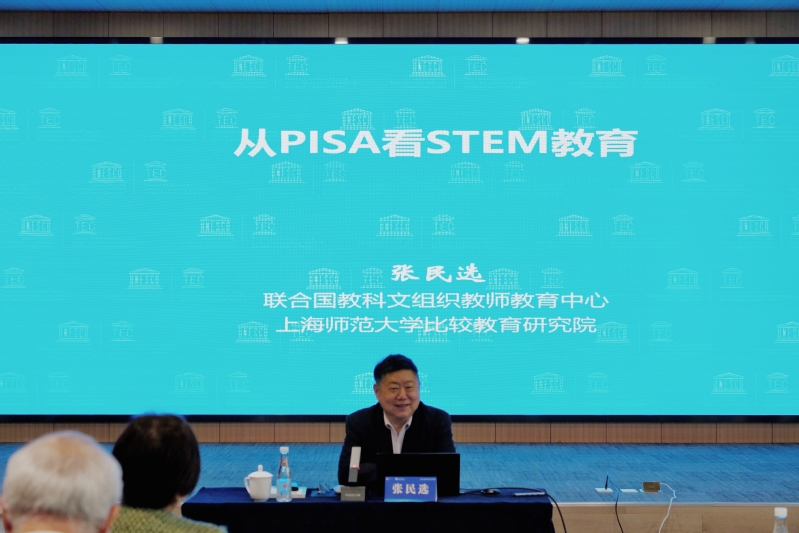
In the Shanghai-Hong Kong exchange session, Hong Kong teachers actively asked questions to Director Ni, discussing how to better carry out STEAM education in a context-appropriate manner and involve more people in it, and Director Ni responded patiently. Subsequently, Tung Wah Group of Hospitals Choi Wing Sing Primary School and Sheng Kung Hui Lee Ping Secondary School shared their respective STEAM education courses, and Director Ni Minjing commented on them.
In the visit session, the program delegation visited Yangjing Juyuan Experimental School, Xuhui District Youth Activity Centre, Jing'an District Education College Affiliated School, and Shanghai Natural History Museum.
At Yangjing Juyuan Experimental School, the delegation first observed a lesson themed Changes in Water Temperature. The teacher guided students to conduct experiments independently, stimulating their inquiry and hands-on abilities. In the discussion session, the school first presented the development of its STEM education and gave a case explanation titled Research and Development of Domino Science Experiment Devices Based on Multi-sensor Implementation, vividly demonstrating the positive results of the school's STEM education.
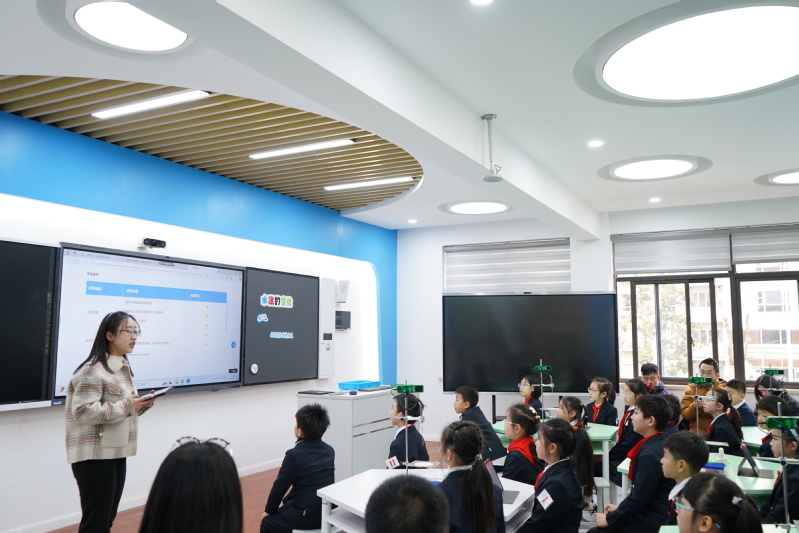
At Xuhui District Youth Activity Centre, Director Qian Wenhua detailed the centre's development history to the delegation. As an innovative practice base and showcase platform for quality-oriented education in Xuhui District, the centre adheres to the mission of for children, for the future. In STEM education, it not only focuses on student cultivation but also on STEM teacher training, generating many valuable experiences worthy of reference and promotion.
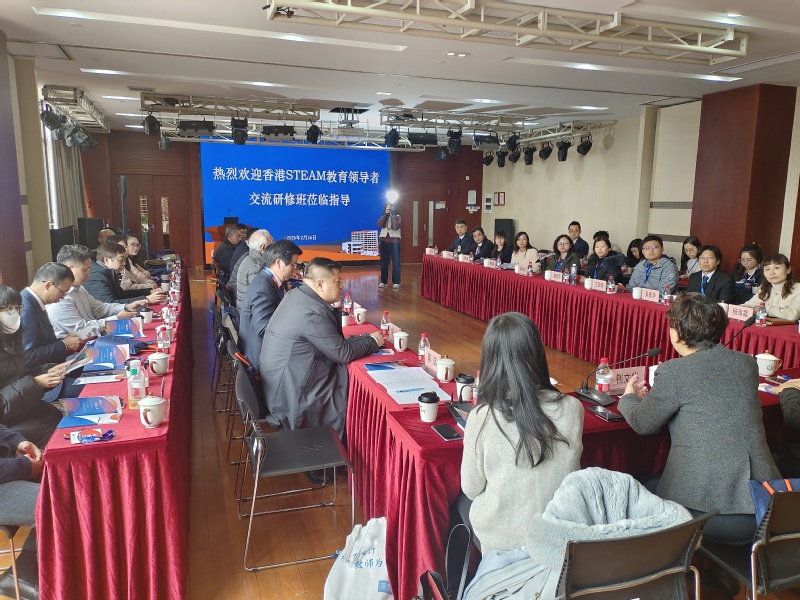
At Jing'an District Education College Affiliated School, Qiu Zhongning, Director of Jing'an District Education Bureau, extended a warm welcome to the delegation. Director Qiu emphasized that Jing'an District attaches importance to cultivating students' comprehensive qualities in basic education and fully practices the student-oriented concept advocated by the state, hoping that both sides would learn from each other through this exchange. Principal Ni Jiming detailed how the school transformed from a weak one to a strong one through reform, developing a distinctive educational path suitable for its own development. In the afternoon, Wang Jie, Director of the School Office of Jing'an District Education College Affiliated School, gave a report titled Building a Series of 'Student-Centered' Interdisciplinary Integrated Learning Spaces while guiding the delegation on a tour. Director Wang elaborated on how the school created educational spaces with a student-centered approach to maximize space efficiency in service of students and interdisciplinary education. The school's hardware and software facilities are well-equipped, with a unique architectural layout. In particular, nearly half of the school's ground space is used for sports facilities, reflecting the school's focus on students' physical health, which was impressive. The delegation also observed the school's signature courses Fun Spectrum themed Tiangong One-Week Health Plan. In the discussion session, both sides exchanged ideas and agreed to strengthen exchanges and collaboration to share STEM education experiences.
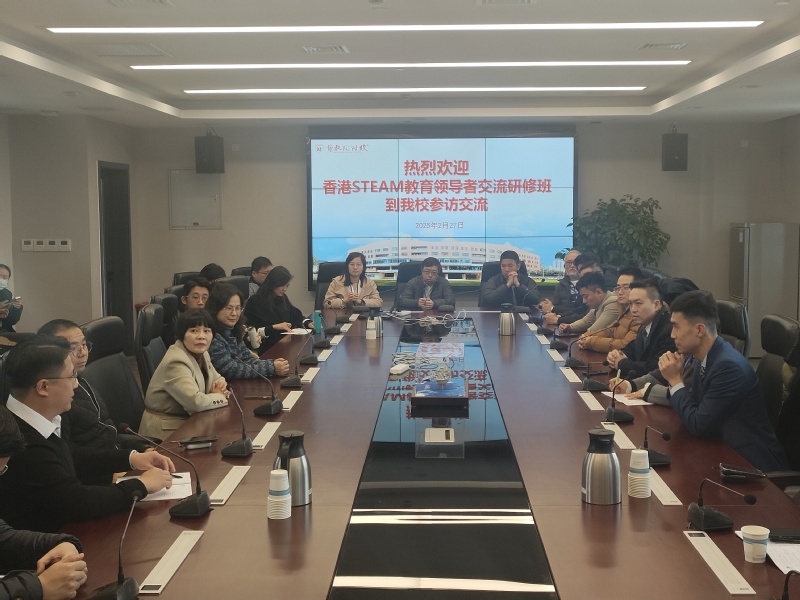
At Shanghai Natural History Museum, guides led the delegation on a tour with detailed explanations. The diversity of the museum's collections and the richness of its content left every member of the delegation deeply impressed. In the subsequent discussion, museum staff demonstrated the important role of Shanghai Natural History Museum in STEM education. The museum organizes many interesting activities for teenagers, attracting them to visit, observe, practice, and experience, enhancing their curiosity and satisfying their inquisitiveness, thereby imperceptibly improving their thinking and hands-on abilities.
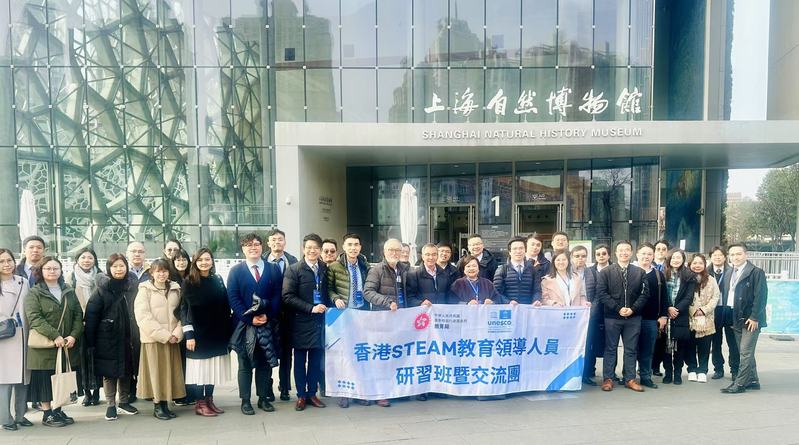
This was the second session of the Hong Kong STEAM Education Leaders Training Program. In the future, Shanghai and Hong Kong will strengthen exchanges and cooperation in the field of STEAM education to cultivate more talents with innovative spirit and practical ability.
(Contributions/Photos provided by: UNESCO Teacher Education Centre)




